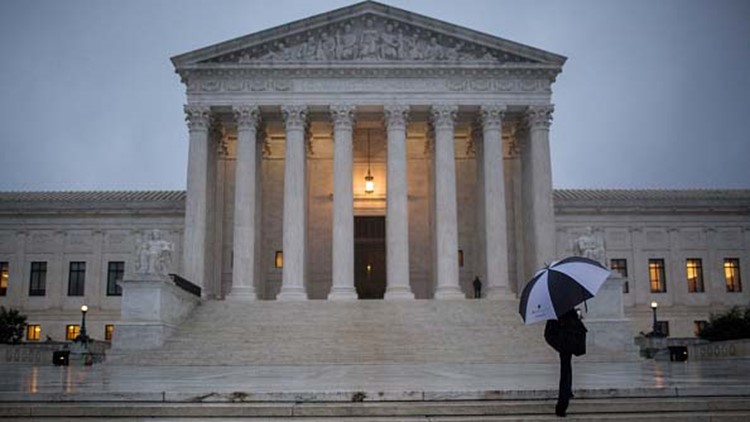WASHINGTON – Tyson Timbs sold a few grams of heroin worth less than $400 to undercover police officers in 2013 – a crime for which he was forced to pay for by losing a Land Rover that cost him 100 times that amount.
The disparity is at the heart of a Supreme Court case to be argued Wednesday on whether the Eighth Amendment's prohibition of "excessive fines" applies to the states. If the justices rule that it does, hefty fees, fines and forfeitures imposed by state and local governments may be in jeopardy.
Indiana's seizure of Timbs' Land Rover – purchased for $42,058 before he put an additional 16,000 miles on it – has united conservative and liberal interest groups against what they see as increasingly greedy governments. Two dozen friend-of-the-court briefs have been filed on his behalf from groups as distinct as the U.S. Chamber of Commerce and the Southern Poverty Law Center.
Those court papers point to a trend that resulted last year in some 10 million people owing more than $50 billion, according to a study by the John F. Kennedy School of Government at Harvard University and the National Institute of Justice. It's a trend the court's conservative and liberal justices might find objectionable.
Among examples cited by left- and right-wing groups:
- A Georgia man was sentenced to pay $360 monthly while on probation for stealing a $2 can of beer.
- A Missouri couple racked up $180,000 in fines for lacking turf grass in their yard.
- A Michigan man who underpaid his 2011 property tax by $8.41 had his property auctioned off for $24,500.
- A Colorado man was fined $678 and racked up $1,680 more in collection fees for violating open container laws and driving without proof of insurance.
- A Florida homeowner who did not register a burglar alarm with the local government accrued $75 daily fines, resulting in a $115,625 lien on his property.
Timbs' conviction resulted in a year's home detention, five years' probation and about $1,200 in fees. But it was the seizure of his SUV, purchased with life insurance proceeds after his father's death, that led to the lawsuit. The 2012 Land Rover LR2 is even a named plaintiff.
'Most basic liberties'
Many of the seemingly excessive fines and forfeitures are contested and later reduced. But a ruling from the Supreme Court that clearly applies the Eighth Amendment's prohibition could cut down on their imposition in the first place.
"When the Eighth Amendment was ratified in 1791, protections against excessive fines were already fundamental and deeply rooted in the Anglo-American legal tradition," lawyers for Timbs argued in their petition. "When the 14th Amendment was ratified in 1868, the right continued to rank among Americans’ most basic liberties. That remains equally true today."
Two lower courts agreed with that argument. But the Indiana Supreme Court reversed last year on the grounds that the excessive fines clause doesn't apply to the states.
"Indiana is a sovereign state within our federal system, and we elect not to impose federal obligations on the state that the federal government itself has not mandated," the court ruled.
The case represents the latest effort to determine what portions of the Bill of Rights apply to the states. Some parts, such as the Second Amendment's right to bear arms for self-defense, have been extended. But others, such as the right to a unanimous jury verdict under the Sixth Amendment, have not been.
Paying for municipal services
The state's seizure of Timbs' Land Rover is defended by several national municipal groups. They argued in court papers that the vehicle was used in heroin trafficking that may have generated profits equal to its price, and that its forfeiture properly left Timbs without the ride he needed for his craft.
The groups' support is not surprising. State and local governments increasingly use funds collected in criminal and civil cases to pay for municipal services. The 100 cities with the highest proportion of revenue from fines and fees in 2012 financed between 7 percent and 30 percent of their budgets that way, the ACLU said.
"Perhaps because they are politically easier to impose than generally applicable taxes, state and local governments nationwide increasingly depend heavily on fines and fees as a source of general revenue," its friend-of-the-court brief said.
The practice often leads low-income defendants further into poverty, crime, prison and recidivism, the liberal Southern Poverty Law Center and libertarian Cato Institute argued in court papers. The American Bar Association noted that nearly two-thirds of prisoners have little prospect of paying fines and fees upon their release.
►Make it easy to keep up-to-date with more stories like this. Download the 10News app now.
Have a news tip? Email desk@wtsp.com, or visit our Facebook page or Twitter feed.



